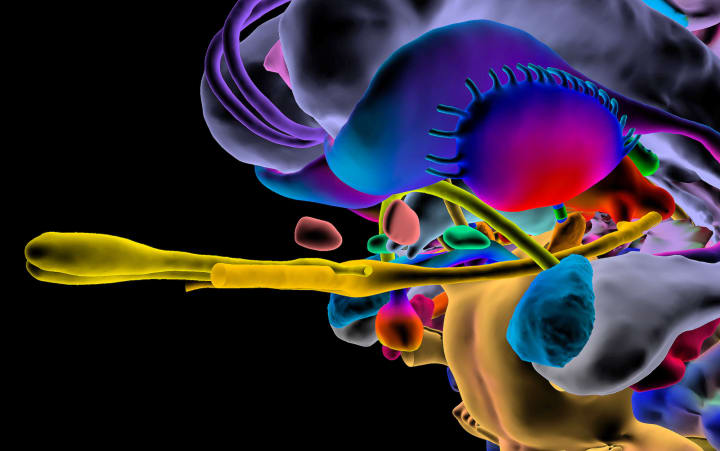Unleashing Memory Potential: How Deep Brain Stimulation Enhances Recall and Fights Dementia
Harnessing the Power of Electrical Impulses During Sleep to Boost Memory and Safeguard Cognitive Health

Have you ever wished for a simple method to enhance your memory while you sleep? Exciting developments in the field of neuroscience have shown that deep brain stimulation (DBS) during sleep could potentially boost memory and even lower the risk of dementia. In this article, we will delve into the fascinating world of DBS and its potential benefits for memory enhancement.
1. Introduction
Memory plays a crucial role in our daily lives, enabling us to recall past events, learn new information, and make informed decisions. As we age, however, our memory capabilities may decline, making it challenging to retain and retrieve information. Researchers and scientists have been exploring innovative methods to enhance memory, and one promising avenue is deep brain stimulation.
2. Understanding Deep Brain Stimulation
Deep brain stimulation is a neurosurgical procedure that involves the implantation of electrodes in specific areas of the brain. These electrodes deliver electrical impulses, modulating the activity of targeted brain regions. Initially developed to treat movement disorders such as Parkinson's disease, DBS has shown potential for broader applications, including memory enhancement.
3. The Connection Between Sleep and Memory
Sleep has long been recognized as a critical factor in memory consolidation. During sleep, our brains process and organize information, strengthening connections between neurons and solidifying memories. Researchers have discovered that certain brain oscillations, such as slow-wave activity and sleep spindles, are closely associated with memory formation and retention.
4. Exploring the Memory-Boosting Potential of Deep Brain Stimulation

Recent studies have focused on leveraging deep brain stimulation techniques to enhance memory during sleep. By targeting specific brain regions involved in memory processing, researchers have been able to amplify memory consolidation. Preliminary findings suggest that DBS can enhance memory recall, improve learning, and increase cognitive performance.
5. Deep Brain Stimulation and Dementia Risk
Dementia is a debilitating condition characterized by cognitive decline and memory loss. As the global population ages, the prevalence of dementia is expected to increase. Researchers are investigating whether deep brain stimulation could play a role in lowering the risk of dementia by preserving cognitive function and delaying memory decline.
6. How Does Deep Brain Stimulation Work?
During deep brain stimulation, electrodes are surgically implanted into specific brain regions. These electrodes deliver controlled electrical impulses, which modulate the activity of targeted neurons. By stimulating the brain in a precise manner, DBS can influence neural circuits involved in memory formation and retrieval.
7. Deep Brain Stimulation Research and Findings
Initial studies exploring the memory-enhancing effects of deep brain stimulation have shown promising results. Researchers have conducted experiments on animals, such as rodents, demonstrating improved memory performance with DBS. Human trials are also underway, with participants reporting enhanced memory capabilities after undergoing deep brain stimulation during sleep.
8. The Future of Deep Brain Stimulation for Memory Enhancement
As our understanding of the brain continues to expand, deep brain stimulation holds great potential for memory enhancement. Ongoing research aims to optimize stimulation parameters, identify the most effective brain targets, and develop personalized approaches to DBS. In the future, it is possible that deep brain stimulation could become a mainstream method for memory improvement.
9. Considerations and Limitations
While the prospect of deep brain stimulation for memory enhancement is exciting, several considerations and limitations need to be addressed. Ethical concerns, potential risks and side effects, long-term effects, and individual variations in response to stimulation are among the factors that researchers and healthcare professionals must carefully evaluate and mitigate.
10. Conclusion
Deep brain stimulation during sleep shows promise as a potential tool to boost memory and lower the risk of dementia. By precisely targeting specific brain regions involved in memory processing, researchers have demonstrated enhanced memory recall and cognitive performance. While further research is necessary, deep brain stimulation holds exciting possibilities for memory enhancement in the future.
About the Creator
Ranjan Kumar Pradhan
Unleash your curiosity and dive into a realm of captivating wonders. Join me on a journey of knowledge, inspiration, and thought-provoking insights. Let's embark on an extraordinary adventure together.





Comments
There are no comments for this story
Be the first to respond and start the conversation.